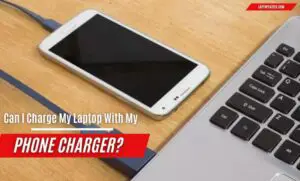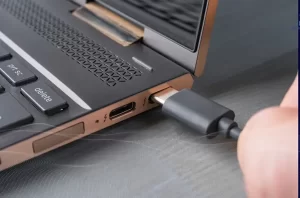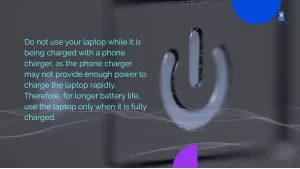The Truth About Charging Your Laptop With A Phone Charger
Phone Chargers And Laptops: What You Need To Know

It is generally not safe to Charge My Laptop With My Phone Charger. Laptop chargers typically have higher voltage and wattage requirements compared to phone chargers, which may not provide enough power to charge the laptop properly and could potentially damage the device or charger.
It’s a common predicament – your laptop is about to run out of juice, and your charger is nowhere in sight. In a moment of desperation, you glance at your phone charger and wonder – can I actually use this to charge my laptop?
It seems like it should work, right? A charger is a charger. But while using your phone charger to charge your laptop in a pinch may technically work, there are some important factors to consider before relying on this setup for the long-term.

Credit: Youtube
In this guide, we’ll dive into the key differences between phone and laptop chargers and look at the potential risks and limitations of using a phone charger to charge your laptop. We’ll also provide some best practice tips for charging your laptop on the go. Let’s take a closer look!
Voltage and Amperage Differences
One of the main differences between phone and laptop chargers is the voltage and amperage they provide. Let’s break it down:
Phone chargers typically provide 5V of power at 1-2A (amps). This level is designed to charge your phone battery safely and efficiently.
Laptop chargers, on the other hand, usually provide higher voltages – often 15V, 20V, or even higher for some models. They also supply a higher amperage, generally around 3-6A.
This increased voltage and amperage is required to charge the much larger laptop battery. It also powers the laptop components while in use.
Trying to power and charge a laptop with the lower 5V/1-2A from a phone charger is like trying to fill up a truck with the fuel nozzle for a compact car. It may work, but it will be painfully slow and struggle to provide enough sustained power.
Charging vs Powering
This brings us to a key distinction between charging and powering.
While a phone charger may be able to slowly charge a laptop over time, it likely won’t be able to sufficiently power the laptop while it’s turned on and in use.
The laptop will still be slowly draining its battery even when plugged into the weaker phone charger. The lower voltage and amps going into the laptop will not be enough to both charge the battery AND power the energy-hungry components for regular operation.
Think of it like a bucket with holes draining water while you add some back in with a tiny hose. You may be able to slowly add some charge back to the battery, but not enough to operate the laptop fully.
So if you need to use your laptop for an extended period of time, a phone charger is not an ideal solution even in a pinch. It likely won’t provide enough sustained power and your laptop battery will still drain.
Safety Hazards and Risks
Using an underpowered phone charger to charge a higher-voltage laptop can lead to safety hazards like overheating. Laptop components are designed to draw power at a specific rate, and insufficient power from the charger can overload it, causing intermittent shutdowns or potential damage over time. Regularly charging your laptop with a phone charger is not recommended due to these risks. Always monitor for overheating issues when using such setups. It’s best to use the charger specifically designed for your laptop.
When It May Be Okay in a Pinch?
Using your phone charger to squeeze in a bit of extra laptop juice in a pinch is generally okay with some precautions.
If your laptop is turned off and not in use, charging it with a phone charger for a short period likely won’t cause any damage. This can help provide some minimal extra charge until you can access the proper OEM charger.
Just don’t leave it charging overnight or for extended unattended periods, as even turned off laptops can overheat from underpowered adapters. And remember it will charge very slowly, so don’t expect to gain a significant boost in battery.
Ideally you want to get the laptop back on its proper charger as soon as possible. Relying on trickle charging from a phone adapter should only ever be a super temporary solution.
Alternate Safe Charging Options
Rather than using your phone charger to charge your laptop in a pinch, here are some safer options to consider:
Portable charger power bank – Higher capacity power banks designed for laptops can provide multiple full charges. Charge up your power bank ahead of time for guaranteed power on the go.
Compact OEM laptop charger – Many laptop brands sell compact charger versions designed for travel. Keep one in your bag as a backup for when you forget your main charger.
External battery pack – These attach to the laptop to provide supplementary battery life. Charge them ahead of time and only use your laptop’s charger to recharge them.
Charge at a public station – Some airports, schools, offices, and other public places provide laptop charging stations you can use in a pinch.
Use an available outlet – If there’s an available wall outlet, you can often find a compatible donated laptop charger nearby in public spaces. Ask politely to borrow; many people are happy to help!

Credit: Youtube
FAQs Of Can I Charge My Laptop With My Phone Charger
Can charging my laptop with a phone charger damage it?
It’s unlikely that occasionally charging with a phone charger will immediately damage your laptop, but over time it can degrade the battery’s capacity and the charging system. The risk of damage goes up the more frequently you use an under powered charger. Monitor closely for overheating.
How long will it take to charge my laptop with a phone charger?
It depends on the capacity of both your phone charger and laptop battery, but generally expect charge times of 8 hours or longer to gain even a partial charge. This lengthy, slow charging can put strain on your battery over time.
What should I look for in a compatible charger?
You want to match voltage and ensure the charger provides sufficient amperage for your specific laptop model. Look for an output of 15V/3A or higher. Matching the official OEM charger specs is ideal for safety and performance.
Can I use a USB-C phone charger on a USB-C laptop?
While the connector may fit, the power output is still lower. Make sure your USB-C phone charger can provide enough voltage/amperage to fast charge higher capacity USB-C laptops before relying on it.
Should I buy a compact spare laptop charger for travel?
Yes, having an extra lightweight OEM charger in your bag can save you in a pinch if you forget or lose your regular one. Look for travel chargers designed for your specific laptop make and model for optimal performance and safety.
Conclusion
At the end of the day, it’s generally risky and not recommended to charge your laptop with a phone charger, especially in the long-term. While it may work in a pinch, it can slow down charging, overheat your devices, and degrade components over time.
Investing in supplemental charging tools like power banks, external batteries, and compact OEM chargers specifically designed for your laptop will make your on-the-go power needs much easier and safer to fulfill. And you’ll never have to desperately wonder “can I charge my laptop with my phone charger again!

I am a technology Specialized writer and blogger based in the USA & UK. I have four years of experience in Cyber Security, Technology, Social Media and all types of electronic devices like computer laptops etc. So I work on solving these issues and give various tips on these issues



